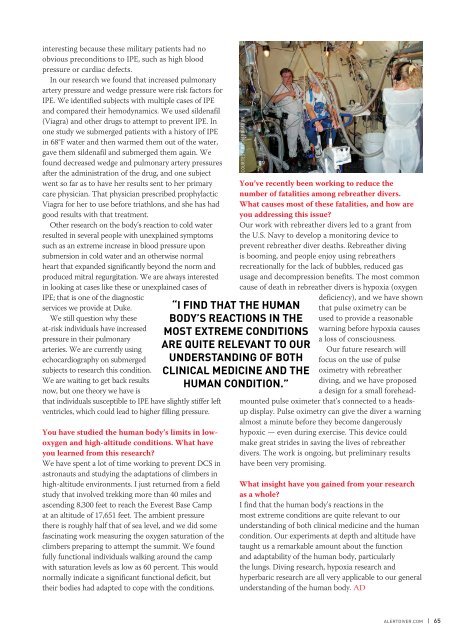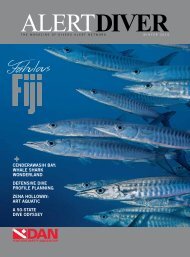AD 2017 Q3
Alert Diver is the dive industry’s leading publication. Featuring DAN’s core content of dive safety, research, education and medical information, each issue is a must-read reference, archived and shared by passionate scuba enthusiasts. In addition, Alert Diver showcases fascinating dive destinations and marine environmental topics through images from the world’s greatest underwater photographers and stories from the most experienced and eloquent dive journalists in the business.
Alert Diver is the dive industry’s leading publication. Featuring DAN’s core content of dive safety, research, education and medical information, each issue is a must-read reference, archived and shared by passionate scuba enthusiasts. In addition, Alert Diver showcases fascinating dive destinations and marine environmental topics through images from the world’s greatest underwater photographers and stories from the most experienced and eloquent dive journalists in the business.
Create successful ePaper yourself
Turn your PDF publications into a flip-book with our unique Google optimized e-Paper software.
interesting because these military patients had no<br />
obvious preconditions to IPE, such as high blood<br />
pressure or cardiac defects.<br />
In our research we found that increased pulmonary<br />
artery pressure and wedge pressure were risk factors for<br />
IPE. We identified subjects with multiple cases of IPE<br />
and compared their hemodynamics. We used sildenafil<br />
(Viagra) and other drugs to attempt to prevent IPE. In<br />
one study we submerged patients with a history of IPE<br />
in 68°F water and then warmed them out of the water,<br />
gave them sildenafil and submerged them again. We<br />
found decreased wedge and pulmonary artery pressures<br />
after the administration of the drug, and one subject<br />
went so far as to have her results sent to her primary<br />
care physician. That physician prescribed prophylactic<br />
Viagra for her to use before triathlons, and she has had<br />
good results with that treatment.<br />
Other research on the body’s reaction to cold water<br />
resulted in several people with unexplained symptoms<br />
such as an extreme increase in blood pressure upon<br />
submersion in cold water and an otherwise normal<br />
heart that expanded significantly beyond the norm and<br />
produced mitral regurgitation. We are always interested<br />
in looking at cases like these or unexplained cases of<br />
IPE; that is one of the diagnostic<br />
services we provide at Duke.<br />
We still question why these<br />
at-risk individuals have increased<br />
pressure in their pulmonary<br />
arteries. We are currently using<br />
echocardiography on submerged<br />
subjects to research this condition.<br />
We are waiting to get back results<br />
now, but one theory we have is<br />
that individuals susceptible to IPE have slightly stiffer left<br />
ventricles, which could lead to higher filling pressure.<br />
You have studied the human body’s limits in lowoxygen<br />
and high-altitude conditions. What have<br />
you learned from this research?<br />
We have spent a lot of time working to prevent DCS in<br />
astronauts and studying the adaptations of climbers in<br />
high-altitude environments. I just returned from a field<br />
study that involved trekking more than 40 miles and<br />
ascending 8,300 feet to reach the Everest Base Camp<br />
at an altitude of 17,651 feet. The ambient pressure<br />
there is roughly half that of sea level, and we did some<br />
fascinating work measuring the oxygen saturation of the<br />
climbers preparing to attempt the summit. We found<br />
fully functional individuals walking around the camp<br />
with saturation levels as low as 60 percent. This would<br />
normally indicate a significant functional deficit, but<br />
their bodies had adapted to cope with the conditions.<br />
“I FIND THAT THE HUMAN<br />
BODY’S REACTIONS IN THE<br />
MOST EXTREME CONDITIONS<br />
ARE QUITE RELEVANT TO OUR<br />
UNDERSTANDING OF BOTH<br />
CLINICAL MEDICINE AND THE<br />
HUMAN CONDITION.”<br />
COURTESY RICHARD MOON<br />
You’ve recently been working to reduce the<br />
number of fatalities among rebreather divers.<br />
What causes most of these fatalities, and how are<br />
you addressing this issue?<br />
Our work with rebreather divers led to a grant from<br />
the U.S. Navy to develop a monitoring device to<br />
prevent rebreather diver deaths. Rebreather diving<br />
is booming, and people enjoy using rebreathers<br />
recreationally for the lack of bubbles, reduced gas<br />
usage and decompression benefits. The most common<br />
cause of death in rebreather divers is hypoxia (oxygen<br />
deficiency), and we have shown<br />
that pulse oximetry can be<br />
used to provide a reasonable<br />
warning before hypoxia causes<br />
a loss of consciousness.<br />
Our future research will<br />
focus on the use of pulse<br />
oximetry with rebreather<br />
diving, and we have proposed<br />
a design for a small foreheadmounted<br />
pulse oximeter that’s connected to a headsup<br />
display. Pulse oximetry can give the diver a warning<br />
almost a minute before they become dangerously<br />
hypoxic — even during exercise. This device could<br />
make great strides in saving the lives of rebreather<br />
divers. The work is ongoing, but preliminary results<br />
have been very promising.<br />
What insight have you gained from your research<br />
as a whole?<br />
I find that the human body’s reactions in the<br />
most extreme conditions are quite relevant to our<br />
understanding of both clinical medicine and the human<br />
condition. Our experiments at depth and altitude have<br />
taught us a remarkable amount about the function<br />
and adaptability of the human body, particularly<br />
the lungs. Diving research, hypoxia research and<br />
hyperbaric research are all very applicable to our general<br />
understanding of the human body. <strong>AD</strong><br />
ALERTDIVER.COM | 65









